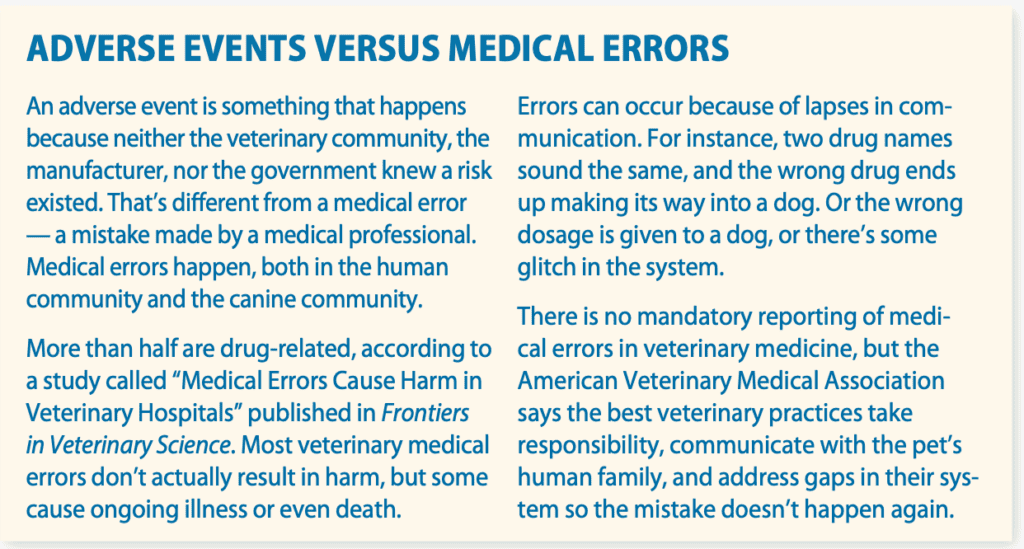Your dog has a bad reaction after eating a certain food, getting a particular vaccine, having a topical applied to ward off ticks or other parasites, or undergoing home treatment with a device that is supped to relieve pain or heal a wound. Does the adverse reaction have to be reported? No. There is no legal requirement. Should it be? Yes.
 Once a product hits the market, the only way the veterinary community and the government agencies that oversee salable items can tell if it might be causing harm to dogs is to look at data collected over time. The manufacturer needs to know, too. No reputable maker of products intended to improve dogs’ health wants to keep putting something out there that has the opposite effect. But if people with dogs don’t take the step of making sure their dog’s reaction is reported, the aggregation of data may not be strong enough to suggest a problem when one does in fact exist. Thus, it’s critical that you do your part by making sure the information is sent to the relevant organization. Here’s how.
Once a product hits the market, the only way the veterinary community and the government agencies that oversee salable items can tell if it might be causing harm to dogs is to look at data collected over time. The manufacturer needs to know, too. No reputable maker of products intended to improve dogs’ health wants to keep putting something out there that has the opposite effect. But if people with dogs don’t take the step of making sure their dog’s reaction is reported, the aggregation of data may not be strong enough to suggest a problem when one does in fact exist. Thus, it’s critical that you do your part by making sure the information is sent to the relevant organization. Here’s how.
1. Alert the vet. Contact your dog’s doctor if you think your pet has had a bad reaction to a medicine or some other product. The vet will determine whether it’s a transient problem that will self-resolve or whether the dog should be seen and treated. The vet can also help make a determination about whether the dog is reacting to the product or whether the animal’s not feeling well is simply a coincidence that seems related to the product but is not.
Ask the vet, too, whether she will be reporting what looks like an adverse reaction to the appropriate government agency. The American Veterinary Medical Association “strongly encourages veterinarians to report adverse events” and has even developed an Adverse Event Reporting Policy to increase veterinarian buy-in.
1a. If the vet is not planning to report the reaction, you can and should do so on your own. Here are the appropriate agencies, depending on the product you think may have caused the reaction.
For dog foods and FDA-approved products such as animal medications and devices, report the adverse event to the FDA online at fda.gov/safety/report-problem-fda or by calling 1-888-FDA-VETS (1-888-332-8387).
For vaccines, report the adverse event to the U.S. Department of Agriculture (USDA) at the USDA’s APHIS Center for Veterinary Biologics (aphis.usda.gov; search “report an adverse event”) or by calling (800) 752-6255. (APHIS stands for Animal and Plant Health Inspection Service.)
For flea and tick products and other pesticides, report the adverse event to the Environmental Protection Agency (EPA) at the website for the National Pesticide Information Center (run by Oregon State University at npic.orst.edu; search the A-Z index under R for “reporting a pet exposure or illness”) or by calling (800) 858-7378.
2. Either you or your dog’s veterinarian should contact the manufacturer of the product. While neither the general public nor veterinarians are required to report possible adverse reactions, the manufacturer must report the incident to the appropriate government oversight agency. Not only is it a legal imperative, it is a financial one. As we said above, a good manufacturer will not want to keep a product on the market that is making dogs sick.





